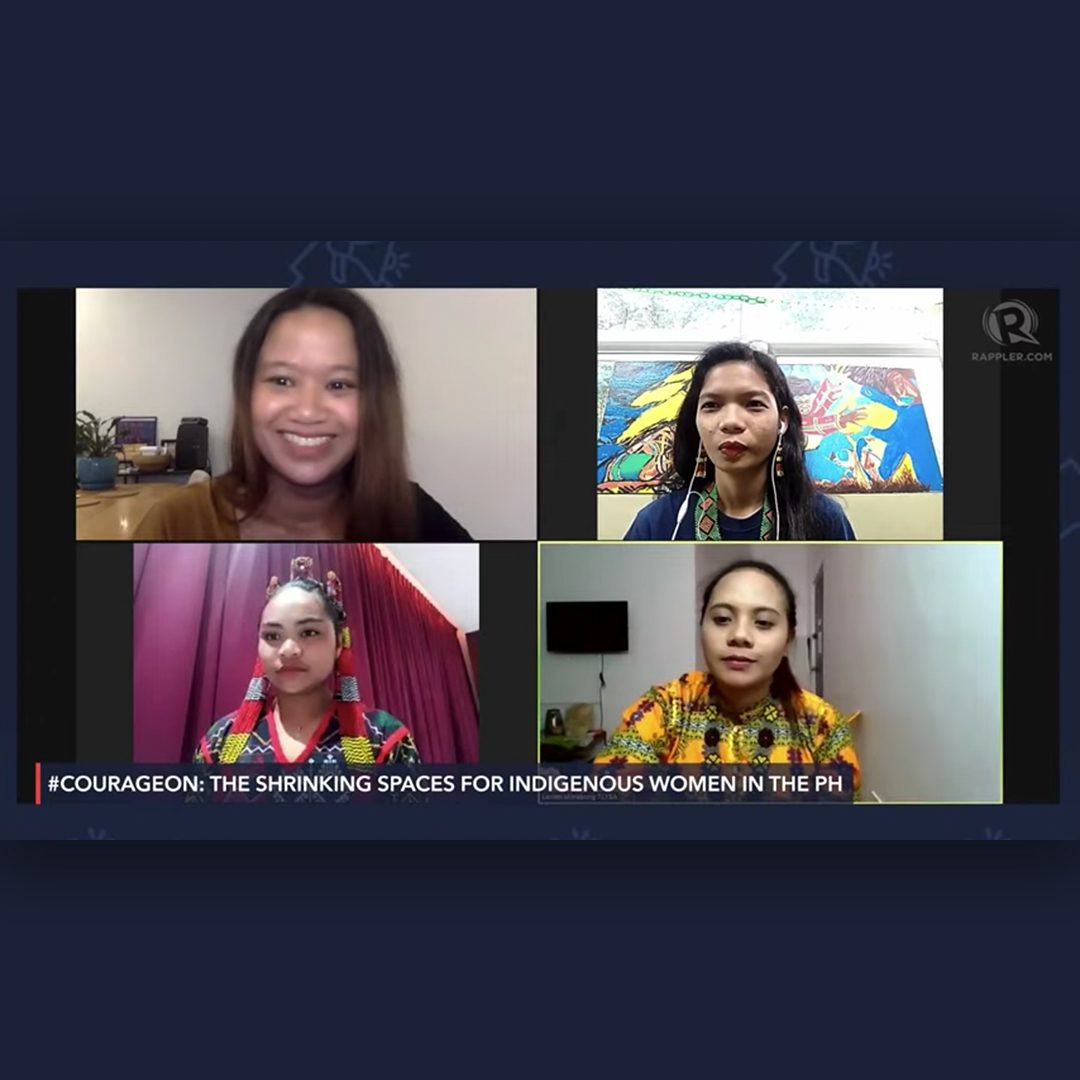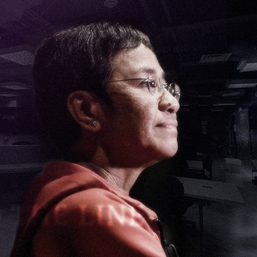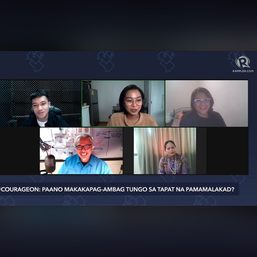SUMMARY
This is AI generated summarization, which may have errors. For context, always refer to the full article.

How can we better support indigenous communities amid the threats they face? Indigenous women and indigenous peoples (IP) rights advocates said one way is to provide more spaces for their voices to be heard in national institutions and policy-making
They said this during the seventh episode of MovePH’s “#CourageON: Tumindig, Makialam, Kumilos” community show.
There are over 17 million indigenous peoples in the Philippines as of 2020, according to data from the National Commission on Indigenous Peoples (NCIP). Despite being protected by Republic Act No. 8371 or the Indigenous Peoples’ Rights Act (IPRA), they continue to face threats and harassment, with others being displaced due to development projects in their ancestral lands.
Victoria Tauli-Corpuz, former United Nations special rapporteur on indigenous peoples rights, and LILAK overall coordinator Judy Pasimio said that NCIP and IPRA are not enough to protect IP.
“Ang tingin ng gobyerno sa mga katutubo who [have] been protecting our resources and our environment, ay sagka sa progress; istorbo. Kaya iba talaga ang pagtingin nila sa mga katutubo – ‘pag nag-pu-push sila at nag-a-assert ng kanilang karapatan sa kanilang mga lupaing ninuno, pinapatay at karahasan ang tugon, [o kaya naman] pinapalikas ang mga katutubo,” Pasimio said.
(The government looks at indigenous people, who have been protecting our resources and our environment, as an obstacle to progress; a hindrance. So they really look at the indigenous people differently – when they push and assert their rights to their ancestral lands, the response is murder and violence, [or] indigenous people are displaced.)
They also pointed out that it doesn’t help that NCIP chairperson Allen Capuyan is also the executive director of the National Task Force to End Local Communist Armed Conflict (NTF-ELCAC) that had been red-tagging journalists, progressives, and indigenous peoples without evidence. (READ: New war: How the propaganda network shifted from targeting ‘addicts’ to activists)
Pasimio said that Capuyan’s involvement in the task force is reflected in the NCIP’s priorities.
“So kung sa tanong na nagawa ba ang mandato ng NCIP [ang sagot] ay hindi kasi napakalaki pa ang parte ng mga ancestral domain ang hindi pa nare-recognize at nade-delineate, which is the mandate of NCIP,” Pasimio said.
(On the question if the NCIP did its mandate, the answer is no because a huge chunk of ancestral domain have yet to be recognized and delineated, which is supposed to be their mandate.)
With lives at stake, these false accusations could end up with killings of indigenous peoples, similar to what happened in the massacre and arrest of members belonging to the Tumandok community in Panay Island.
Impacts on communities
According to T’boli Manobo S’daf Claimants Organization Youth member Jesmarie Dinyan, many are struggling to keep their culture and people alive in their ancestral lands because of the little protection offered to their communities.
She especially cited the Tamasco massacre and its long-lasting effects on her community. In the Tamasco massacre, indigenous leader Datu Victor and seven others were killed in December 2017 after months of protesting the expansion of a coffee plantation in their ancestral lands. Global Witness reported that the military perpetrated the killings, but the military later claimed that the eight were caught in a crossfire between the military and the New People’s Army (NPA).
“Naapektuhan kami sa nakikita namin kung paano naghihirap ang mga [Lumad] lider na naghahanap ng hustisya araw-araw sa kung ano mang pwede naming gawin sa aming lupang ninuno. Habang pinapatagal nang pinapatagal ‘yung proseso [ng imbestigasyon], nauubos at nauubos kaming mga indigenous people dito,” Dinyan said.
(We get affected as we see how Lumad leaders suffer every day in seeking justice in our ancestral land. As the process of the investigation drags on, the number of indigenous people keep pn dwindling.)
Pasimio pointed out that these land conflicts occur because of supposed opposing views of indigenous peoples and the government on the issue of development. She said that for indigenous peoples, development only happens when a community continues to preserve their ancestral lands for the sake of future generations. Pasimio said the government perception is that land is a source of profit despite irreversible consequences to the environment.
“’Yung kultura ng mga Lumad ay nakaangkla sa lupa, at ang lupa ay buhay. So kapag nawala [ang] lupa, mawawala [ang] kultura. At kapag nawala [ang] kultura, ano [na ang magiging] identity ng mga Pilipino?” Lumad Bakwit School volunteer teacher Rose Hayahay said.
(The Lumad’s culture is rooted to the land, and land is life. If the land is gone, our culture is also gone. And if we don’t have our culture, what will be the Filipinos’ identity?)
Forward IP representation
Indigenous women and indigenous peoples rights advocates emphasized during the #CourageON community show the need to appoint leaders who would help gain recognition of their rights in government, institutions, and policy-making circles.
Dinyan said IP representation should also start within their communities, with women and youth like her given avenues to voice out their concerns on pressing issues happening within their groups.
“Parati kong naririnig na lalaking matatanda ang palaging leader ng isang komunidad. So kami na mga kabataang kababaihan, pina-practice na rin po namin na mamuno sa aming komunidad at ‘yun po ‘yung isang matinding responsibidad na ginagawa ko ngayon,” Dinyan added.
(I have always heard that older men are always the leader of a community. So we young women, we are also practicing to lead our community and that is a great responsibility that I am doing now.)
Corpuz suggested that IP representation can also be a collective endeavor, through utilizing social media platforms to provide spaces for IPs to tackle human rights violations as well as their position on issues in relation to the 2022 elections.
To further address their concerns in larger institutions, Pasimio suggested an appropriate representative in government who can help them come up with sustainable platforms that would forward IP communities’ demand for necessary services and resources in political decision-making arenas.
“Breaking their [indigenous people] isolation also means putting them forward. It’s good that they are represented, but it is [better] that they themselves are present in these spaces. We let them speak, we let them articulate what are the current issues, especially this coming elections,” Pasimio said in a mix of Filipino and English.
In celebration of the National Indigenous Peoples Month in the Philippines, the #CourageON community show gathered indigenous women and advocates to discuss how we can help address the unique challenges faced by Lumad communities. The show is organized by Rappler’s civic engagement arm MovePH in partnership with Friedrich Naumann Foundation for Freedom and LILAK (Purple Action for Indigenous Women’s Rights. – Rappler.com
Waya Lao is a Rappler intern from the University of the Philippines Diliman. She is a senior taking up a Bachelor of Arts degree in Philippine Studies majoring in Creative Writing and Anthropology.
Add a comment
How does this make you feel?

![[WATCH] #CourageON: History repeats itself?](https://www.rappler.com/tachyon/2022/09/community-show-ls.jpg?resize=257%2C257&crop=435px%2C0px%2C1080px%2C1080px)
![[WATCH] #CourageON: Bakit nakababahala ang pagbabawal ng libro?](https://www.rappler.com/tachyon/2022/09/rsz_pagbabawal_libro-ls2.jpg?resize=257%2C257&crop_strategy=attention)


There are no comments yet. Add your comment to start the conversation.